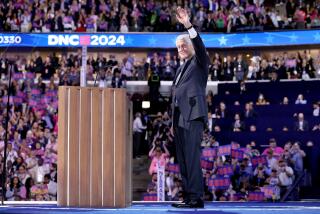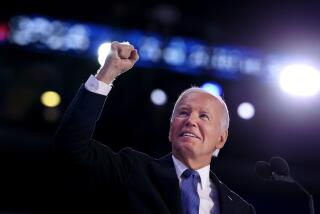Presidential Vote a Referendum on Race Relations, Clinton Declares : Democrats: With nomination virtually locked up, he turns attention directly to Bush. AFL-CIO endorses him.
- Share via
CHARLOTTE, N.C. — Like the pall that lingered over Los Angeles even after the flames of last week’s riots were doused, the political fallout from the unrest in California continued to shadow the presidential race Tuesday.
Arkansas Gov. Bill Clinton, on what would have been a celebratory election night, talked not of three more primary victories but of the racial strife that has commanded the nation’s attention.
Aiming his criticism directly at President Bush, Clinton declared that the presidential election was a referendum on the nation’s approach to race relations and the disparate lives of its people.
“This election is not a fight between Republicans and Democrats,” he told about 100 supporters in the atrium of an office building here. “It’s a fight about whether America is joining the ranks of the rest of the advanced countries in the world, whether we’re going to have a real partnership in the private sector to restore real jobs all across America and high wages and real opportunity to the people of this country. . . .
“Most of all, it’s about whether we’re going to abandon our paralyzing divisions, whether we can create opportunity and impose responsibility and come together as a country.”
Clinton scored decisive victories Tuesday in North Carolina, Indiana and the District of Columbia, which were expected to raise his total number of convention delegates to more than 1,700. According to Democratic Party rules, 2,145 are needed for first-ballot nomination.
But Clinton’s back-to-back victories in New York, on April 7, and Pennsylvania last week have already made him the presumptive nominee. And with the tension of the primary season largely behind him, Clinton has turned his attentions almost exclusively on Bush.
On Tuesday, as he has for days, Clinton used the Los Angeles riots as an exemplar of the straits in which a divided nation finds itself. He presented himself as the one who could bind the wounds of racial division.
“I am tired of the politics of racial division,” Clinton declared in Charlotte, gesturing toward his supporters. “We are Southerners, you and I, and we have learned the hard way that when we are divided by race we never get anywhere and when we reach across racial lines everyone has a chance for a good education, decent health care and a decent job and to raise their children in dignity.”
The remarks echoed Clinton’s approach earlier in the day, when he traveled to one symbol of urban decay--New York--to talk about another--Los Angeles.
Before several hundred members of the American Newspaper Publishers Assn., Clinton called for a blunt new national reckoning about the societal forces that caused the conflict.
“I do not believe that we can build this country unless we face squarely the fact that millions of our fellow Americans are divorced from the values, the interests and the future that all of us must share,” Clinton said in remarks that were greeted with applause from the largely white audience.
Even as he moved closer to the Democratic nomination for President, Clinton scored another victory Tuesday of potential importance to his general election prospects--the endorsement of the executive council of the AFL-CIO, whose membership has not always been enamored of Clinton. The vote of the 35-member council was unanimous.
Keeping the focus on Bush was central to Clinton’s day. At his New York stop, he took pains to signal support for the President’s move to quell the rioting with federal troops. But he also singled out the Administration’s effort, through presidential spokesman Marlin Fitzwater, to blame Democrat-backed social programs for the violence that spewed across Los Angeles.
“They’ve been in power so long they have to go all the way back to the ‘60s to try to find somebody to blame for denial, for neglect, for division,” Clinton told reporters Tuesday evening in Charlotte.
“I thought it was a sad commentary on an Administration with no answers for America.”
Before the publishers, Clinton repeatedly contrasted his upbringing in a small, poor town in segregated Arkansas with the lives led in South-Central Los Angeles and other areas of urban neglect.
“If we had family, if we had someone to love and discipline us, if we had clothes on our back and a place to sleep at night, we basically felt that we were part of the great American community because we had things that money couldn’t buy and because we believed that tomorrow could be better than today,” he said.
“Today, I tell you, there are millions of people out there who don’t have the things that money can’t buy and who don’t believe that tomorrow will be better than today. All Americans, whether we live in cities or suburbs or quiet rural hamlets, are paying for the unraveling of the American community.”
More to Read
Get the L.A. Times Politics newsletter
Deeply reported insights into legislation, politics and policy from Sacramento, Washington and beyond. In your inbox twice per week.
You may occasionally receive promotional content from the Los Angeles Times.











